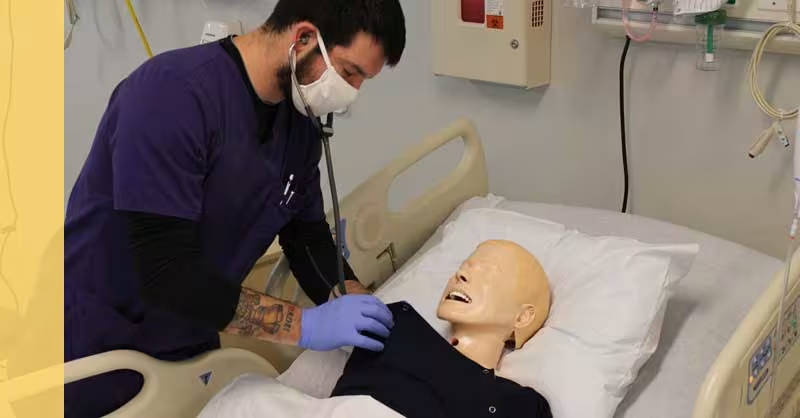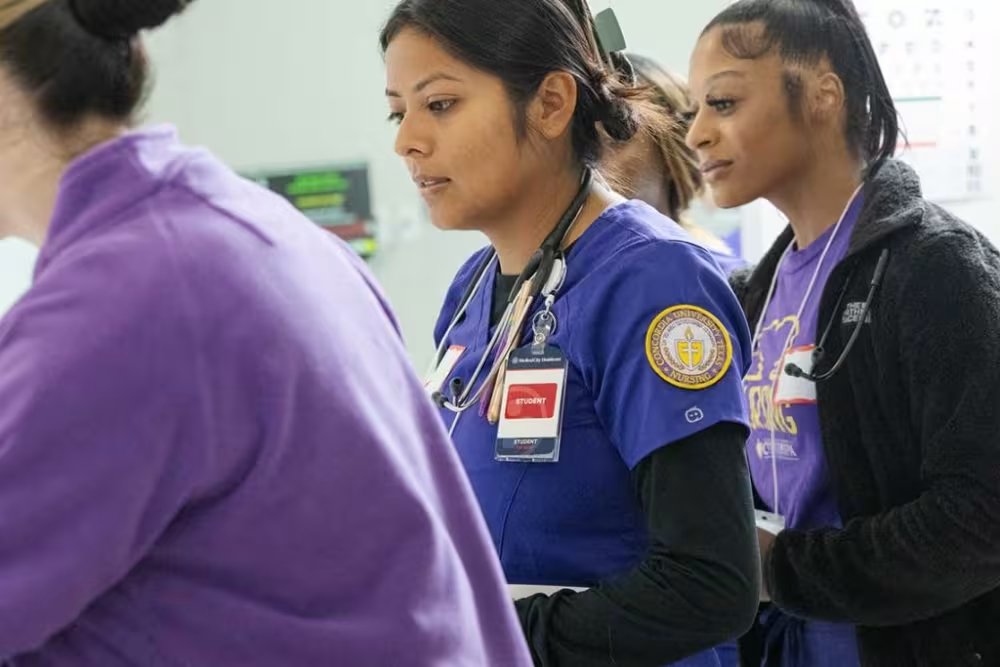Why Is Clinical Experience Important in Nursing?
Each blog post is dated and contains accurate information as of that date. Certain information may have changed since the blog post publication date. If you would like to confirm the current accuracy of blog information, please visit our ABSN overview page or contact admissions at (866) 891-1371.
Why is clinical experience important in nursing? Clinical rotations in nursing school are similar to internships. During clinicals, you’ll be placed in an actual nursing unit, where you’ll provide direct patient care under supervision. Clinicals give you invaluable experience in providing patient care.

It’s not enough for nurses to know the process for inserting an IV line. They must also be able to do it. Similarly, it’s insufficient for nurse to understand the importance of collaboration in nursing; they must be able to function as part of a team providing patient care.
Why is clinical experience important in nursing? Clinical experience allows nurses to put theories into practice and is fundamental to nursing school and career growth.
In nursing school, you’ll work through a rigorous curriculum that blends coursework with nursing skills and simulation labs. You will then put what you’ve learned into practice in real-world care settings during clinical rotations.
The experience you gain through a traditional or accelerated nursing program’s clinicals is critical to your nursing journey.
At Concordia University Texas, our Accelerated Bachelor of Science in Nursing (ABSN) track includes multiple clinical rotations that introduce nursing students to a wide variety of clinical environments, enabling them to practice delivering direct patient care under the supervision of their preceptor.
If you’re thinking of switching to a career in nursing and have prior non-nursing college education, you could earn your degree in as few as 16 months upon successful completion of any needed prerequisites.

Discover eight ways to increase your chances of getting into nursing school.
What Are Clinicals in Nursing School?
Clinical rotations are like the internship of the nursing world, providing valuable on-the-job experience and opportunities to network with working professionals and impress prospective employers.
For each clinical rotation, you’ll be assigned to a specific unit in a healthcare facility. You’ll have a clinical instructor, who is a registered nurse (RN) and will serve as your supervisor. Your clinical instructor provides direction and can answer any questions you may have.
During clinicals, you will provide direct patient care under supervision. You’ll begin with easier tasks and move on to more complex nursing tasks as your nursing coursework and labs become more advanced.
Why Is Clinical Experience Important in Nursing Education?
In nursing school, you’ll work on developing nursing skills during your skills labs and learn to respond appropriately to various patient scenarios in your nursing simulation labs; however, there’s nothing quite like practice in an actual hospital to cement your skills.
You’ll learn a great deal every shift while working with experienced nurses who can offer guidance.
Learn about the fundamentals of skills and simulation labs in nursing school.

Why is clinical experience important in nursing education for skill-building? It allows you to practice crucial clinical skills, like taking vital signs and placing IV lines. You’ll also learn how to interact with patients in a professional and calm manner. In addition, clinicals provide opportunities to polish these important nursing skills:
- Adaptability
- Communication skills
- Critical thinking and analytical reasoning
- Empathy
- Nursing process application
- Patient charting
- Problem-solving
- Teamwork and collaboration
- Time management
- The use of nursing technology
How Do Clinicals Prepare You for a Nursing Job?
Healthcare employers need to know that the nurses they hire can deliver appropriate, competent, and high-quality care that prioritizes patient health and safety. No matter how well you excel in skills and simulation labs, you’ll need to apply your skills in realistic settings like a hospital.
Clinical rotations give you the opportunity to develop a greater level of nursing competence and, consequently, self-confidence.

What to Expect From Clinicals as a Nursing Student
Each clinical rotation shift starts with a team meeting or pre-conference. You’ll discuss the plan for the day and review your assigned patients. This is also a good opportunity to ask any questions.
During your shift, you’ll perform nursing tasks, such as taking vital signs, performing assessments, administering medications, and assisting with the activities of daily living (ADLs).
Throughout clinical rotations, you can expect to complete one or more care plans for the patients you’re working with. Each care plan has five components:
- Assessment
- Nursing diagnosis
- Plan
- Intervention
- Evaluation
You’ll also be evaluated on factors like preparation and participation. Always follow your instructions and adhere to clinical guidelines. Never administer medication to a patient without the presence of a clinical instructor or other RN.
At Concordia University Texas, our nursing students gain clinical experience in multiple nursing specialties, including:
- Acute care
- Adult health
- Intensive care
- Long-term care
- Mental health
- Obstetrics
- Pediatrics
How to Prepare for Clinical Rotations
Why is clinical experience important in nursing? Clinical placements serve two main important functions: to provide experiential learning with actual patients and to help you acclimate to clinical settings. There are several ways you can prepare for clinicals and make the most of them.
1. Don’t Be Afraid to Ask Questions
Asking questions is integral to the learning process. Never hesitate to ask for clarification when you’re unsure of something or feel that you need to learn more. On a busy shift, however, you might not be able to ask every question as it arises. Write down your questions in a notebook to ask at a more opportune time.

2. Come Prepared
It’s essential that you show up to clinicals prepared. Complete your assigned readings and any other work related to your assignments in advance. In addition, arrive in uniform and look floor-ready, such as by tying back long hair.
3. Be Professional
Clinicals provide opportunities to develop your professionalism. Part of that means arriving for each shift early and prepared. It also encompasses the following:
- Demonstrating a positive attitude, no matter the task
- Maintaining respect for all and being polite
- Strictly adhering to professional ethics
- Taking accountability and responsibility for one’s actions
4. Go Above and Beyond
Try to do more than the minimum. If you find yourself with a few spare moments, ask how else you can help. This makes a good impression and provides additional learning opportunities.
5. Be Organized
It’s a challenge to keep track of all your obligations in nursing school. The last thing you’ll want to do is forget about a shift or neglect a homework assignment. Use a day planner or scheduling app to stay on track.
6. Find Your Support System
When times are challenging, you can lean on other nursing cohort members for support.
Consider organizing a study group shortly after beginning the track. It’s an opportunity to connect with your cohort members while also staying on top of your work.

As you prepare for nursing school, consider following these 11 tips for success.
7. Keep an Open Mind
Keeping an open mind is crucial for the learning process. Try not to make assumptions. Instead, if you’re unsure of why a nurse did something in a certain way, ask. You can also apply this mindset to your career planning. Even if you had your heart set on pediatrics, for example, a rotation in intensive care might change your mind.
8. Take Time for Yourself
Self-care helps prevent burnout. Whether this involves taking a walk, attending an exercise class, or meeting up with friends, taking some time away from nursing school will support your wellness.

Change Your Career Trajectory in as Few as 16 Months
Concordia University Texas offers an accelerated nursing track that allows you to graduate in as few as 16 months after completing prerequisites. Our ABSN locations in Austin and Dallas-Fort Worth provide extensive student support, including dedicated nursing instructors and Academic Success Coaches.
Contact us today to find out if our accelerated nursing track is right for you. You’ll be assigned a dedicated admissions counselor who will explain the eligibility requirements and guide you through each step of the admissions process.
